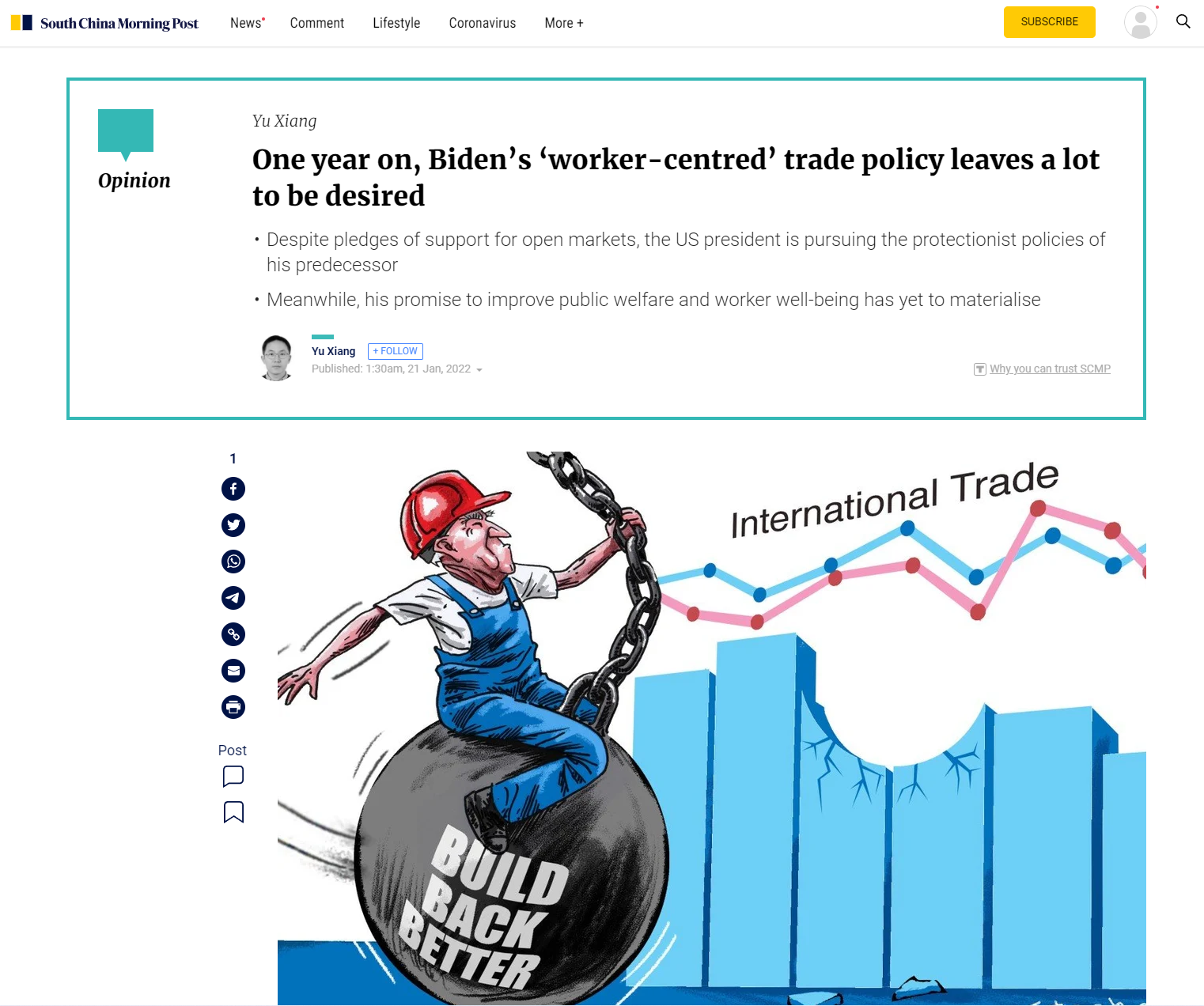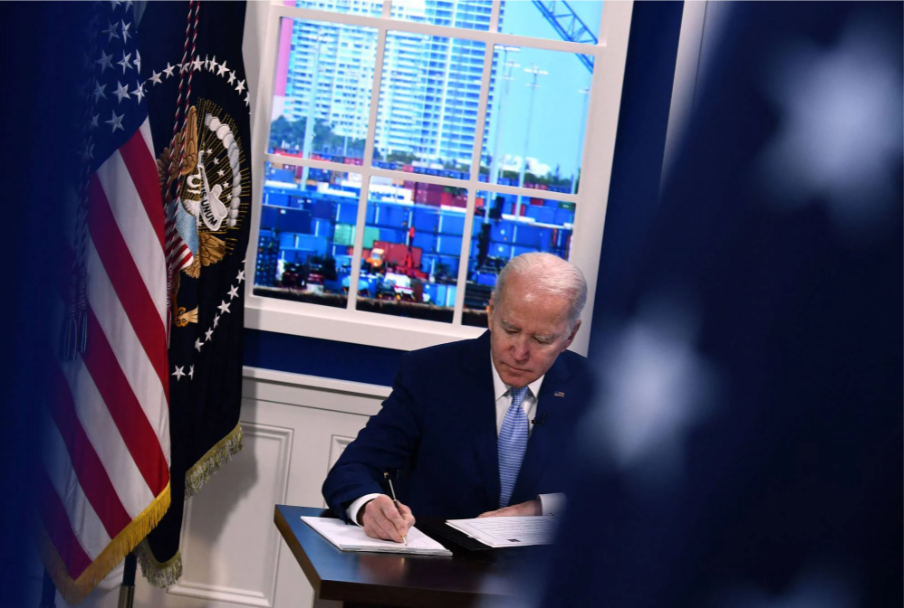Yu Xiang is an adjunct fellow at the Centre for International Security and Strategy, Tsinghua University, a China Forum expert and a senior research fellow at China Construction Bank. The article reflects the author’s opinions and not necessarily the views of China Construction Bank
US President Joe Biden came to office promising to correct the mistakes of the Trump administration. He has now been in office for a year and it’s time to review some of his achievements.
On trade, Biden proposed a “worker-centred policy” that has proved to be much less effective than planned.
The stated mission of the Office of the US Trade Representative is to work towards “opening markets throughout the world to create new opportunities and higher living standards for families, farmers, manufacturers, workers, consumers, and businesses”.
We should judge the effectiveness of its policies by how well it has achieved this aim, and by this measure, the Biden administration’s trade policy has fallen short in at least three areas. First, it has not fulfilled its commitment to opening markets worldwide.

An important way to promote market opening is to reduce bilateral tariffs, facilitate trade and investment procedures and promote regional free trade. However, many of the tariffs imposed by the Trump administration on foreign steel and aluminium, and the high tariffs imposed on US$250 billion of Chinese imports, have yet to be removed.
Formal negotiations for the US to remove tariffs on British steel and aluminium have only just started and, in November, the US said talks with Japan had begun. But the tariffs remain in place, more than a year after Donald Trump left office.
US Commerce Secretary Gina Raimondo has also made it clear that the Biden administration would not re-engage in the Comprehensive and Progressive Trans-Pacific Partnership Agreement (CPTPP) but would instead prepare to set up an Indo-Pacific economic framework that will be better than the CPTPP and more robust than a traditional trade agreement.
Biden’s clearest statement so far on this new economic framework came in a speech last October, when he said it would “define our shared objectives around trade facilitation, standards for the digital economy and technology, supply chain resiliency, decarbonisation and clean energy, infrastructure, worker standards, and other areas of shared interest”.
The concept is still vague, however, with few details on how the US could realise it. And as we all know, the grander the policy, the more goals it involves, until it finally becomes a slogan that drifts with the wind. After all, the United States has in the past made empty promises to other countries through its various frameworks, plans and strategies.
Second, Biden’s international trade policy has made very limited contributions to improving public welfare. On the contrary, due in part to supply chain disruptions, inflation is on the rise.
Biden’s trade policy is actually a continuation of Trump’s “America first” policy framework. It is protectionist in nature and the criticism of Biden’s trade policy is as loud as that for Trump’s.

History has shown that protectionism cannot increase the well-being of American workers. According to a Moody’s report in May last year, US importers absorbed more than 90 per cent of the additional costs resulting from the 20 per cent US tariff on Chinese goods. Meanwhile, US exporters also absorbed most of the costs from tariffs imposed by China.
If Biden’s trade policy were effective – that is, if it could defy the laws of labour division and industrial specialisation, and promote the return of industries to the US – then inflation caused by the logistical bottlenecks in supply chains in the second half of last year could not be explained.
The factors driving the increase in US consumer prices include the rising costs of energy, and products and parts used for making goods – such as middle- and low-end chips – all of which are related to international trade. Last month, the US consumer price index rose to 7 per cent, a 39-year high.
Meanwhile, the US current account deficit has continued to increase. In the third quarter of 2021, it widened by US$16.5 billion, or 8.3 per cent, to US$214.8 billion, according to the US Bureau of Economic Analysis. Rising inflationary pressures and trade deficits have exposed the failure of America’s trade policy.
Third, Biden’s “worker-centred” trade policy is biased. The mission of the trade office is not only to improve workers’ well-being, but also that of farmers, manufacturers, consumers and the general public. If Biden wants to please only workers, that could be at the expense of other groups.
For example, trade bodies have expressed dissatisfaction with Biden’s policies. In a speech this month, US Chamber of Commerce CEO Suzanne Clark called on the Biden administration to act: “Winning the future means competing in global markets and competing for global leadership,” she said. “By one vital measure – trade – we’re standing still. And that means we’re falling behind.” She also warned against government overreach.
Biden’s worker-centred policy is essentially a US-worker-oriented trade policy, which is contrary to the so-called universal human rights that Biden advocates.
International trade is essential to give full play to comparative advantages. Its starting point is a focus on efficiency. To alleviate concerns about inefficiency, trade policy must be complemented by social policies and measures to protect livelihoods. The lack of supporting policies is the reason for the problems facing the working class in the United States.
So it’s time for Biden to face the problems inherent in his international trade policy. Only by returning to the path of opening up and cooperation will his “Build Back Better” agenda be achieved in a sustainable and prosperous way.
